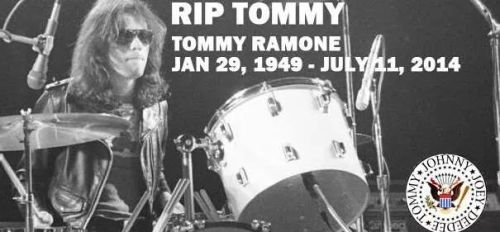THE DEATH OF TOMMY AND LINEAR EXISTENCE
It’s been a little over three weeks since the passing of Tommy Ramone. Profile pictures in tribute have been replaced, and the eulogizing has ceased. Thankfully, the online eulogizing for the man who played drums on the first three Ramones albums was kept to a minimum. It’s not like he was Maya Angelou, even though the Ramones were about as ugly as Maya Angelou.
It’s more than a little comical when people who did not personally know a particular famous musician, actor, writer, artist, or whatever, get misty eyed and put up shit online that amounts to a eulogy for a dead stranger.
It’s not as if death erases their works. That’s the thing about the arts—They are immortalized. You can still go back and listen to that album or read that book. So what’s the problem? Another example of group thought and follow the leader I suppose.
I put up a little R.I.P. for Tommy Ramone on my Facebook and left it at that. I have to admit when he died I felt something. It wasn’t sadness or loss, but it was something. Initially, I wasn’t quite sure what it was.
I’m not a huge Ramones fan. Out of their entire, massive discography, I’ve owned only four albums: the obligatory Ramones Mania collection, the first self titled one, the lackluster Subterranean Jungle, and the much overlooked Road to Ruin.
To be honest ,I think the Ramones are overrated, as overrated as Nirvana and the Beatles.
Joey’s vocals often sounded like mumbling, and the bulk of the lyrics were dumb and disposable. The saving grace of the Ramones, for me, was always Johnny’s guitar; that high-voltage buzzsaw attack that was all down-strokes is the definitive punk guitar sound, yet I can think of at least fifty other punk bands I would rather listen to instead of the Ramones.
My favorite segment and era of the punk rock was always the Southern California bands of the early ’80s, T.S.O.L., the Adolescents, Circle One, Youth Brigade, Bad Religion, and of course Black Flag.
Yes, I recognize that the aforementioned bands probably wouldn’t have came to be without the foundation the Ramones built,, but I still would rather listen to the old school L.A. bands. The argument that the Ramones should occupy some elevated pantheon because they were the founding fathers of a genre is similar to the argument that blues trumps rock because the foundations of rock’n roll are found in the blues. Yeah, I get that, but preferences are preferences. 
So, what was it that I felt when Tommy Ramone died? It wasn’t surprise. He was proceeded in death by three other band members: Joey in 2001, Dee Dee in 2002, and Johnny in 2004. Linear existence is no surprise. We are all going to die. And that was it! The death of Tommy Ramone reinforced the harsh reality of linear existence.
I mean for fuck’s sake, it’s 2014, and all the original members of the Ramones are dead, so is Michael Jackson, and R.E.M. broke up a few years ago.
And that is a trip for me to think about, a reminder that today is today and yesterday was yesterday.
Of course I realize time can only move forward, and we all have a future date with a pinebox and a headstone. To acknowledge this fact is one thing, easy to do. Actually dealing with it and, fully, accepting is not so easy.
When growing up, we have living, breathing icons and long-standing institutions we live in the shadow of or even admire. They were always there, so when they are gone, the absence can feel surreal and unreal. If it happens over and over again, the world can start to look and feel less and less familiar. ( but keeping up is essential)
Linear existence is a motherfucker, and it took the death of a drummer from a band I’ve always been luke warm on to hammer home that point. Thanks, asshole.





